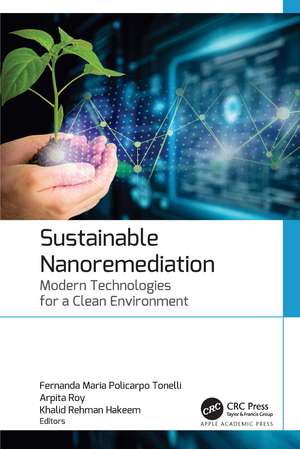Sustainable Nanoremediation: Modern Technologies for a Clean Environment
Editat de Fernanda Maria Policarpo Tonelli, Arpita Roy, Khalid Rehman Hakeemen Limba Engleză Hardback – 13 dec 2024
Preț: 1252.32 lei
Preț vechi: 1376.18 lei
-9% Nou
Puncte Express: 1878
Preț estimativ în valută:
239.71€ • 260.46$ • 201.48£
239.71€ • 260.46$ • 201.48£
Carte tipărită la comandă
Livrare economică 21 aprilie-05 mai
Preluare comenzi: 021 569.72.76
Specificații
ISBN-13: 9781774916100
ISBN-10: 177491610X
Pagini: 652
Ilustrații: 164
Dimensiuni: 156 x 234 mm
Greutate: 1.37 kg
Ediția:1
Editura: Apple Academic Press Inc.
Colecția Apple Academic Press
ISBN-10: 177491610X
Pagini: 652
Ilustrații: 164
Dimensiuni: 156 x 234 mm
Greutate: 1.37 kg
Ediția:1
Editura: Apple Academic Press Inc.
Colecția Apple Academic Press
Public țintă
Academic and PostgraduateCuprins
1. Environmental Pollution: Core Contaminants and Threats to Human Life 2. Nano-Phytoremediation of Environmental Pollution 3. Nanoremediation: Prospects and Amendments 4. Nanoremediation Associated with Microorganisms 5. Nanoparticles as Tools to Remediate Environmental Pollution 6. Nanoremediation of the Environment: Nanoparticles’ Characteristics, Advantages, and Applications 7. A Brief History of Green Synthesis of Nanomaterials 8. Green Methods to Synthesize Nanomaterials to Remediate Polluted Environs 9. Green-Synthesized Nanomaterials Potential for Environmental Pollution Remediation 10. Eco-Friendly Synthesis of Silver Nanoparticles: Principles and their Antimicrobial Characteristics 11. Green Synthesis of Nanomaterials from Algae Materials to Remediate Environmental Pollution 12. Algae-Based Nanoparticles to Contaminated Environs Nanoremediation 13. Plant-Based Nanomaterials to Contaminated Environs Nanoremediation 14. Plant Derived Nanocellulosic Materials: A Promising Technology Application in Environmental Bioremediation 15. Green Iron Nanoparticles for Nanoremediation 16. Green Silver Nanoparticles for Nanoremediation 17. Green Palladium Nanoparticles for Nanoremediation 18. Green Copper Nanoparticles for Nanoremediation 19. Green Prussian Blue Nanoparticles for Nanoremediation 20. Green Titanium Oxide Nanoparticles for Nanoremediation 21. The Novel Technique and Capacity of Green-Gold Nanoparticles in Bioremediation 22. Green Nanomaterials: Biocompatible Materials in Nanoscale? 23. Practical Difficulties in the Application of Green Nanoparticles to Environmental Pollution Remediation
Notă biografică
Fernanda Maria Policarpo Tonelli, PhD, is an Assistant Professor at Federal University of São João del Rei, Divinópolis, Brazil. She specializes in biotechnology/molecular biology and has been studying applications of nanomaterials such as delivery and remediation as well as green synthesis protocols and allelopathic potential of secondary metabolites from plants. She has published books and authored many scientific articles and book chapters and has presented at many national and international conferences. Dr. Tonelli is active in advocacy groups that support gender equality in science. Her efforts as a researcher have been recognized with various awards, including “For Women in Science Brazil” (awarded by L’Oréal Brasil, UNESCO-Brazil, and Brazilian Academy of Sciences) and “Under 30 Brazil” (Forbes), among others.
Arpita Roy, PhD, is an Assistant Professor of Biotechnology at the School of Engineering and Technology at Sharda University, Greater Noida, India. Her specialization is in plant biotechnology, nanobiotechnology, environmental biotechnology, and microbiology. She has edited two books and authored more than 25 scientific articles and 18 book chapters from international publishers. She has presented and participated in numerous state, national, and international conferences, seminars, workshops, and symposiums. She received a commendable research award for excellence in research during the years 2019 and 2020. She has served as an editorial board member and reviewer for several reputed international journals.
Khalid Rehman Hakeem, PhD, is a Professor at King Abdulaziz University, Jeddah, Saudi Arabia, where he is also Head (Plant Biotechnology Research Unit) at the Princess Dr. Najlaa Bint Saud Al Saud Center for Distinguished Research in Biotech. With more than 14 years of teaching and research experience in plant ecophysiology, biotechnology, molecular biology, medicinal plant research, plantmicrobe- soil interactions as well as in environmental studies, he was recently elected as a fellow of the Royal Society of Biology, London. To date, he has authored and edited more than 80 books with international publishers as well as 170 research publications in peer-reviewed international journals and 70 book chapters.
Arpita Roy, PhD, is an Assistant Professor of Biotechnology at the School of Engineering and Technology at Sharda University, Greater Noida, India. Her specialization is in plant biotechnology, nanobiotechnology, environmental biotechnology, and microbiology. She has edited two books and authored more than 25 scientific articles and 18 book chapters from international publishers. She has presented and participated in numerous state, national, and international conferences, seminars, workshops, and symposiums. She received a commendable research award for excellence in research during the years 2019 and 2020. She has served as an editorial board member and reviewer for several reputed international journals.
Khalid Rehman Hakeem, PhD, is a Professor at King Abdulaziz University, Jeddah, Saudi Arabia, where he is also Head (Plant Biotechnology Research Unit) at the Princess Dr. Najlaa Bint Saud Al Saud Center for Distinguished Research in Biotech. With more than 14 years of teaching and research experience in plant ecophysiology, biotechnology, molecular biology, medicinal plant research, plantmicrobe- soil interactions as well as in environmental studies, he was recently elected as a fellow of the Royal Society of Biology, London. To date, he has authored and edited more than 80 books with international publishers as well as 170 research publications in peer-reviewed international journals and 70 book chapters.
Descriere
Overviews low-cost, eco-friendly green synthesized nanomaterials for efficient nanoremediation of environmental pollution. Discusses green methods to synthesize nanoremediators; algae-based and plant-based nanomaterials; different types of green nanoparticles to handle environmental pollutants and more.
